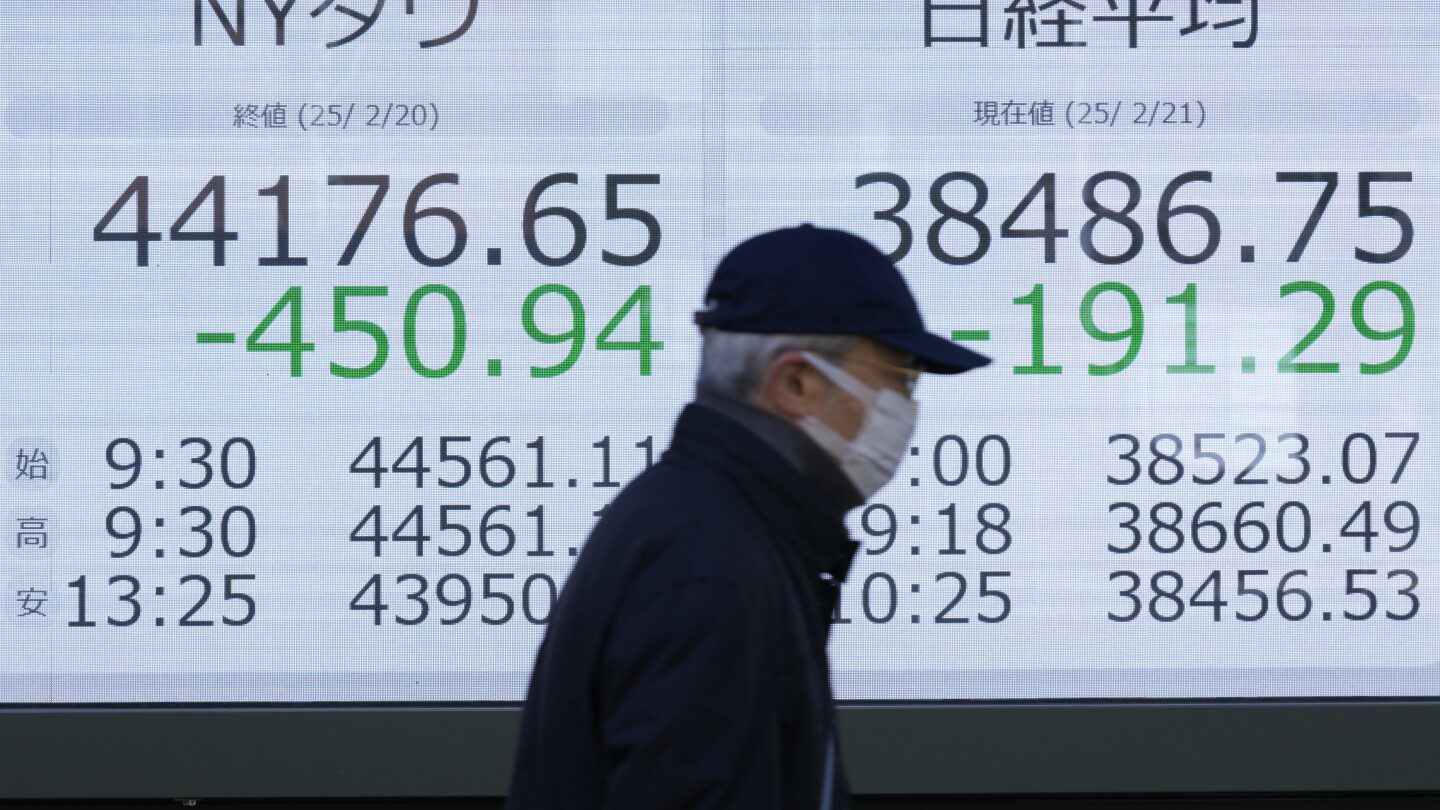
TOKYO (AP) — Asian stock markets showed mixed results on Friday, influenced by a significant decline in Walmart’s performance, which caused Wall Street to pull back from recent record highs.
In Japan, investors were attentive to fluctuations in currency rates, with the Nikkei 225 index rising 0.1% during morning trades to reach 38,719.34.
A declining yen has been advantageous for many Japanese manufacturers that rely on exports. In currency markets, the U.S. dollar climbed to 150.42 yen, up from 149.53. The euro remained steady at $1.0502 compared to $1.0500.
Recently released government data revealed that Japan’s nationwide core consumer price index, which excludes volatile fresh food prices, increased by 3.2% in January year-over-year.
This inflation rate is crucial for the Bank of Japan as it deliberates over interest rate policies, consistently remaining at or above the central bank’s 2% target. Last month, the Bank of Japan raised its key policy rate to 0.5%, up from 0.25%.
In Australia, the S&P/ASX 200 decreased by 0.3% to 8,300.90. South Korea’s Kospi index fell 0.2% to 2,650.17, while Hong Kong’s Hang Seng surged by 2.7% to 23,183.02, largely driven by a jump in shares of Alibaba, which reported impressive financial results.
Alibaba Group Holding, the Chinese e-commerce powerhouse, achieved its highest revenue growth in over a year, surpassing analyst forecasts as it takes advantage of the booming artificial intelligence sector in China. The firm’s net profit soared to 48.9 billion yuan, equivalent to $6.71 billion, as reported on Thursday.
Following these earnings, Alibaba’s stock on the New York market climbed by 8.1%. CEO Eddie Wu announced plans for Alibaba to “aggressively invest” in artificial intelligence and cloud computing infrastructure.
The Shanghai Composite Index rose by 0.6% to reach 3,369.26. In the United States, the S&P 500 declined by 0.4%, marking its first drop after achieving historic highs over the past two days. The Dow Jones Industrial Average fell 450 points, or 1%, while the Nasdaq composite dropped by 0.5%.
Walmart’s stock fell by 6.5% despite the retailer reporting better-than-expected quarterly profits. The Bentonville, Arkansas-based company provided a profit forecast that did not meet analyst expectations, as consumers continue to face high inflation rates and the threat of new tariffs imposed by U.S. President Donald Trump.
Despite the downturn, Walmart projects revenue growth for the upcoming year and asserts its capability in managing tariff impacts. Stocks of other major retailers also suffered: Costco decreased by 2.6%, Target fell by 2%, and Amazon lost 1.7%.
On the other hand, burger chain Shake Shack saw an impressive increase of 11.1% after reporting better-than-expected profits. CEO Rob Lynch mentioned that sales trends remained strong during the quarter, even with adverse weather conditions and wildfires affecting customer traffic in some areas.
Overall, the S&P 500 dropped by 26.63 points to 6,117.52. The Dow Jones Industrial Average fell 450.94 points to 44,176.65, while the Nasdaq composite decreased by 93.89 to 19,962.36.
In the bond market, Treasury yields declined after a report indicated that more Americans filed for unemployment benefits last week than anticipated, suggesting a potential uptick in layoffs, although numbers remain historically low.
This situation may lead the Federal Reserve to adopt a cautious stance regarding interest rates. Last month, the Fed decided against cutting interest rates for the first time at a policy meeting since resuming cuts in September.
At their previous meeting, Fed officials discussed the potential impact of Trump’s proposed tariffs, mass migrant deportations, and robust consumer spending on inflation rates this year.
The yield on the 10-year Treasury bond slipped to 4.50% from 4.54% Wednesday evening, while the yield on the two-year Treasury, which closely tracks the Fed’s expected movements, remained stable at 4.27%.
“Given the significant political implications of high inflation, we believe the Trump administration will avoid measures that could threaten U.S. economic growth or lead to an increase in inflation due to extensive tariffs,” stated Solita Marcelli, chief investment officer for the Americas at UBS Global Wealth Management.
Trump has already granted brief, 30-day extensions for tariffs he had proposed on Mexico and Canada to allow for ongoing negotiations.
In energy markets, the price of benchmark U.S. crude rose by 32 cents to $72.57 a barrel, while Brent crude, the global benchmark, fell by 4 cents to $76.44 a barrel.
___
AP Business Writer Stan Choe contributed to this report from New York.









